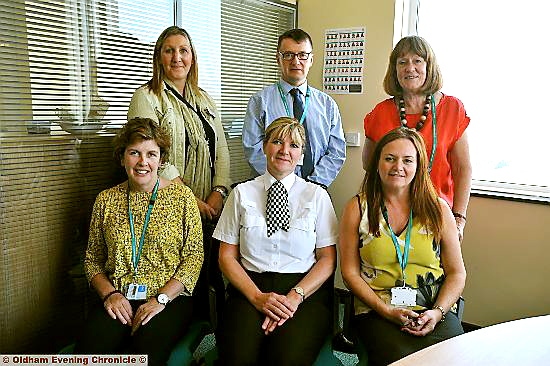The protectors
Date published: 23 September 2014

Photo: Darren Robinson
MASH team leaders: back from left, Det Sgt Lindsey Curry, Chief Insp Haydn Roberts, Councillor Barbara Brownridge. Front, from left, Colette Kelly, Supt Denise Worth and Jill Beaumont.
ROTHERHAM was under national scrutiny when details of widespread child sex abuse came to light last month. Amid the furore, Oldham Chronicle managing editor David Whaley challenged Oldham Council to reveal what it was doing to protect our young people from a simiilar fate. He and deputy news editor Dawn Marsden were invited to visit the council’s front-line troops.
Minimum fuss, zero fanfare, maximum impact. Oldham Council’s MASH team - it stands for Multi Agency Safeguarding Hub - works in an office to which only team members have access.
The issue of child sex abuse and exploitation is always going to be a sensational one for the media and people often see the fight to control it as somewhat exciting.
But as we stepped into the secure room it was clear MASH members do their job with minimum fuss and zero fanfare.
The hub wasn’t set up as a response to events in Rotherham last month, or Oxford in May or even Rochdale in 2012. The partners began working closely together in 2006, originally as Operation Messenger, to help young victims of child sex exploitation.
In its current form, MASH works to identify potential victims and intervene before it’s too late. Early intervention is key.
MASH is made up of police, social workers, health workers, victim support volunteers and domestic violence and drugs specialists, each of whom do their bit to collate information to get a clear picture of the local problem.
Chief Insp Haydn Roberts runs the ROSE (Risk of Sexual Exploitation) team, set up 12 months ago.
He said: “The way children are being targeted is changing. Social media is playing a big part in the grooming process and we have to be aware of that in our fight to control it. Physical abuse is easy to spot; sexual abuse is much more difficult to detect.
“People have a very clear image of what constitutes a victim of sexual abuse, but a quarter of the victims are young boys. Those unsure of their sexuality ask questions on social media sites and get targeted by older men. It’s not as sensational for the media as a gang grooming young girls, but it is happening more and more.”
Jill Beaumont, assistant executive director for public service reform, leads MASH: “The decisions made here are Oldham decisions, not government. The council commits around £1 million each year to help us continue our work. MASH has to be broader than safeguarding; it’s about early intervention.
“Information is shared in real time; we aren’t waiting weeks to get data back. We have access to police computers and everyone who can see information from these is thoroughly checked.
“Our aim is to deal with information passed to us within 24 hours.”
Referrals come to MASH from several sources, from schools and health workers to members of the public.
First Choice Homes, which runs the council’s housing stock, has recently introduced training so all employees can spot potential signs of sexual abuse and report it. This kind of early intervention work is strongly encouraged by the team.
Detective Lindsey Curry said: “When potential victims are referred to us, they are placed on a scale of risk from low to high, and this can change rapidly. It can be an invite to a party, a new friend made on Facebook, unusual absences from school, going missing from home, minor criminal acts, drug taking - these are all the signs that we watch out for.
“Once an abuser has a hold on their victim, it is really hard to get the victim out. We call it a ‘trauma bond’; it’s similar to victims of domestic violence who keep going back to their abuser no matter what. The majority of girls who were exploited by the grooming gang in Rochdale hadn’t been shown affection in their homes, so when an older man showered them with gifts it was hard to explain this wasn’t right.”
Councillor Barbara Brownridge, cabinet member for neighbourhoods and co-operatives, said: “Child sex exploitation is everyone’s business, we want awareness to be as widespread as possible. We need everyone to be our eyes and ears and not be afraid to report anything they think is not right. Our job is to intervene and prevent.”
Superintendent Denise Worth said: “One of our biggest problems is that children often don’t realise they are victims. We have to talk about this; it’s a big learning curve for us all.”
Most Viewed News Stories
- 1Milan Bar in Lees and The Bank at Delph close doors with immediate effect
- 2Latics announce retained list
- 3Punch perfect Kyle is Oldham's latest national boxing champ
- 4Attack on shop worker filmed and posted on Snapchat results in jail sentence for Oldham man
- 5Second-hand music, books and media shop opens in Mossley




